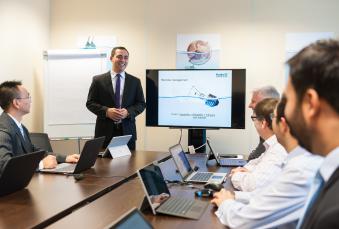Olive & Olive Oil Processing Wastewater Treatment
The timing of harvest is critical to make high-quality olive oil; in order to be turned into a premium product, olives may need to be processed the same day they are harvested. This kind of high-volume production within a compressed timeframe can lead to increased wastewater discharge fees if a plant is not adequately prepared.
Wherever possible, olive processing facilities should be looking to increase efficiency and cut waste. Reusing water, improving wastewater treatment and recovering by-products for onward sale are critical efficiency and cost-saving issues that olive oil producers should be considering.
Our food processing water management solutions can help you recover valuable pomace and produce dewatered output that reduces your transport and handling costs. Additionally, removing these solids from your waste stream gives you options for water reuse, and reduces your wastewater treatment processing needs.
Your water could help save you money. Talk to our experts to find out how.
Our experts recommend: screen olive oil wash-water for water reuse
Olive oil production requires a tremendous amount of water to wash dirt and other impurities from harvested olives to prepare for pressing.
If discharged directly, wash water has the potential to overwhelm sewer treatment systems, and in many places—such as California—it can also attract significant discharge costs. Ideally this process water can be reused to irrigate olive groves or other crops.
However, wastewater that contains solids will clog diffusers and irrigation systems, and problematic Biological Oxygen Demand (BOD) needs to be reduced before that water is suitable for irrigation purposes.
Wastewater is often sent to large settling tanks to allow solids to settle out to make usable irrigation water, but this process leads to a massive amount of settled material that is difficult and expensive to deal with. Some olive oil producers have no choice but to landfill this heavy, high-volume, high water content residual material from their settling tanks.
Transportation costs, fuel costs, and disposal fees add up very quickly; screening this wash water presents opportunities for cost savings.
Our experts recommend: remove, compact and dewater olive oil by-product
After olive oil production, 80% of organic material remains as a by-product.
This material still has value, but conventional recovery methods reduce the profitability of this by-product to use as animal feed. It is often entrained in a slurry with a significant amount of viscous and heavy oil and water, making it difficult to deal with and expensive to transport.
Using fine screening technology to achieve better solids removal can help you recover this valuable material much more efficiently and provide a relatively dry product that can be cost-effectively sold and transported to end users in a wider geographic area than was previously profitable.
What challenge would you like to solve?
We can help you improve your profitability, efficiency and compliance
Sectors
Superior equipment for wastewater treatment with a wide range of well-proven and innovative Hydro products





